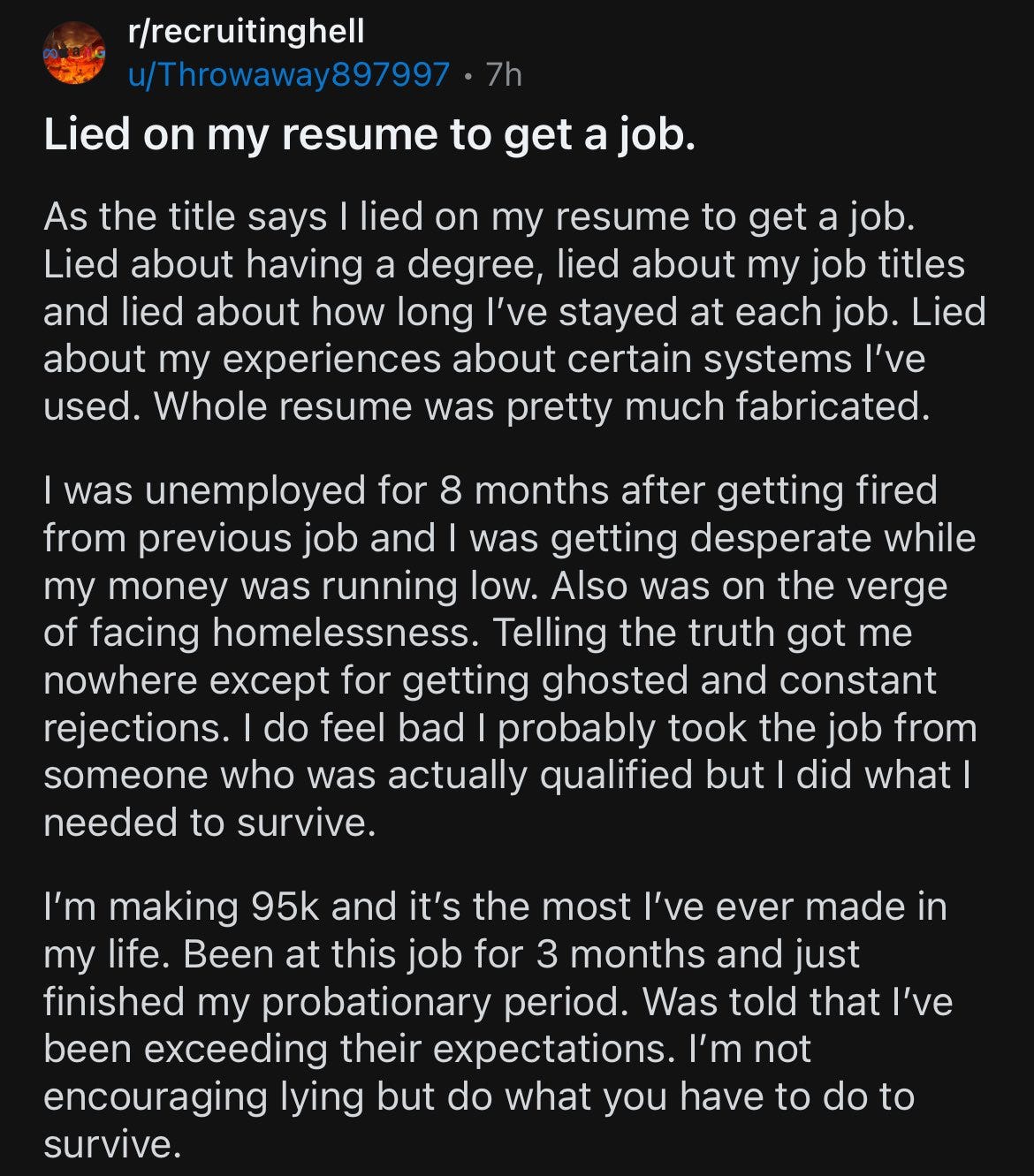Is it Okay to Lie on Your Resume?
Explore the implications of lying on your resume, including potential consequences and ethical considerations, to understand whether it's a risk worth taking.
You might feel like everyone else is lying on their resumes and that a small exaggeration could make the difference between getting your next job or being overlooked. However, before you start embellishing your qualifications or inventing job titles, consider the risks and consequences of being untruthful in your resume.
As a recruiter and career coach who has seen countless resumes and worked with numerous job seekers, I can tell you that the importance of honesty and integrity in the job search process cannot be overstated.
While it might seem like a harmless way to get your foot in the door, lying on your resume can have serious ramifications for your career and reputation.
Reasons People Lie on Their Resumes
When it comes to lying on a resume, there are a few common reasons why job seekers may be tempted to stretch the truth. Let's take a closer look at these motivations and why they can lead people down the wrong path.
Desperation to secure a job
In a competitive job market, some individuals may feel like they need to do whatever it takes to stand out from the crowd. When bills are piling up and the pressure to find employment is high, the temptation to embellish qualifications or experiences can be strong. However, it's crucial to remember that desperation is never an excuse for dishonesty.
Lack of confidence in their qualifications
Another reason people may lie on their resumes is that they don't believe their actual skills and experiences are enough to land the job they want. This lack of confidence can lead them to exaggerate their abilities or invent accomplishments to make themselves seem more impressive. But here's the thing: if you don't believe in your own qualifications, how can you expect an employer to?
Belief that everyone does it
Some job seekers justify lying on their resumes by convincing themselves that everyone else is doing it too. They might think that a little white lie here or there won't hurt anyone and that it's necessary to keep up with the competition. However, just because something is common doesn't make it right or ethical.
According to a survey on job applicant behavior, it was discovered that 70% of candidates tend to be untruthful in their resumes, cover letters, and during interviews.
70% of workers confess they have lied on their resumes with 37% of those admitting that they lie frequently. 37% yes, I lie frequently; 33% yes, I have lied once or twice; 15% no, but I have considered lying; 15% no, and I have never considered lying.
76% of workers admit they have lied in their cover letters, with 50% of those admitting to frequently lying.
80% of workers say they have lied during a job interview, with 44% of those admitting to frequently lying.
There are numerous social media posts where individuals discuss securing jobs by embellishing their resumes. While I recognize that after 8 months, this might become a necessity for some to make ends meet. I would still advise against it if you have only been unemployed for a few weeks and it's not a matter of survival.

Yes, many individuals fabricate their accomplishments by exaggerating the number of people they supervise or inflating their job duties to make their position seem more senior than it actually is. However, just because many people engage in this behavior, it doesn't mean you should do the same.
Common Lies on Resumes
What are the common lies people tend to include in their resumes, cover letters, and interviews? Here are the four I have observed over the years.
1. Inflating work experience
Exaggerating the scope of your responsibilities or achievements in previous roles. For example, someone might claim to have managed a team of 20 people when, in reality, they only supervised a handful of interns. Or they might take credit for a project's success when their role was actually minor. Inflating your work experience might make you seem more qualified, but it's a form of deception that can quickly unravel.
One of the most frequent lies concerns resume gaps, where individuals claim they were travelling instead of acknowledging the challenging job market or difficulty in finding employment. Hiring managers should not be too quick to judge, as everyone deserves a break now and then.
2. Claiming knowledge or skills you don't possess
Some job seekers may be tempted to list programming languages, software proficiencies, or other skills they don't actually have to make themselves appear more well-rounded or competitive. However, if you're hired based on these fabricated abilities, you'll likely struggle to perform the job duties and may even face termination when your lack of knowledge becomes apparent.
3. Exaggerating job titles
Similar to inflating work experience, some people may embellish their previous job titles to make their roles sound more impressive. For instance, a sales associate might list their title as "Sales Manager" to suggest a higher level of authority and responsibility. While it might seem harmless, this type of lie can mislead employers and create unrealistic expectations about your capabilities.
4. Fabricating awards or achievements
Finally, some job seekers may invent awards, accolades, or achievements to make themselves stand out from other applicants. They might claim to have received a prestigious industry award or to have been recognized for their contributions to a major project. However, these lies are often easy to spot with a quick fact-check and can seriously damage your credibility.
How Employers Can Spot Dishonesty
Many recruiters and hiring managers are trained to look for red flags and inconsistencies that may indicate a candidate has been less than truthful.
However, there are several other methods they can use to confirm your experience and determine whether you were being truthful:
1. Background checks before and during employment
Many companies conduct thorough background checks on potential hires before extending a job offer. These checks can include verifying educational qualifications, employment history, and even criminal records. Some employers may also implement ongoing background check verifications throughout your employment, meaning that lying on your resume could cost you your job even after you've been hired.
2. Informal reference checks
Employers may reach out to your former colleagues, supervisors, or other professional contacts to gather more information about your work experience and qualifications. These informal reference checks can uncover discrepancies between what you've claimed on your resume and what others have to say about your abilities and accomplishments.
3. Ex-colleagues working in the company or hired later
It's not uncommon for people to cross paths with former colleagues in new workplaces. If you've lied on your resume and an ex-colleague who knows the truth ends up working for the same company, they may expose your dishonesty to your new employer. Similarly, if the company hires someone you've worked with previously, they may share information that contradicts what you've claimed on your resume.
4. Inconsistencies in the resume or interview responses
Recruiters and hiring managers are trained to spot inconsistencies and discrepancies in your resume and interview responses. If your resume claims you have a particular skill or experience, but you struggle to discuss it in-depth during the interview, it may raise red flags.
Similarly, if the dates or details of your employment history don't align across different parts of your application, employers may become suspicious.
Consequences of Lying on a Resume
While the temptation to lie on your resume might be strong, it's crucial to understand the potential consequences of doing so. Lying on your resume is not only unethical but can also have serious repercussions for your career and personal reputation. Let's explore some of the risks you face when you choose to deceive potential employers.
1. Damage to your credibility and future opportunities
One of the most significant consequences of lying on your resume is the damage it can do to your credibility. If you're caught in a lie, whether during the hiring process or after you've started a new job, it can be difficult to regain trust and respect from your colleagues and superiors. This loss of credibility can limit your future career opportunities, as word of your dishonesty may spread within your industry or professional network.
2. Ethical considerations and the value of trust and integrity
Beyond the practical consequences, lying on your resume is simply unethical. Honesty and integrity are essential values in both personal and professional contexts, and compromising these principles can take a toll on your self-respect and mental well-being. Building a career on a foundation of lies and deception is not only stressful but also unfulfilling in the long run.
3. The risk of getting caught and losing your job
Perhaps the most immediate consequence of lying on your resume is the risk of getting caught and losing your job as a result. Even if you make it through the hiring process, the truth has a way of coming out eventually. Whether it's through a routine background check, an informal reference from a former colleague, or simply being unable to perform the duties you claimed to be qualified for, getting caught in a lie can lead to termination and a permanent mark on your employment record.
Story: When I was working for a recruitment agency, we helped a logistics company hire a new team manager. Within two weeks of starting the job, the company owner called me with concerning news. They had spoken with someone who knew the new manager and confirmed that they had no previous leadership experience, contrary to what they had claimed on their resume. The owner also discovered other discrepancies and lies in the manager's application materials. As a result, the company terminated the manager's employment the very next day due to their lack of integrity.
This story illustrates the very real consequences of lying on your resume. Not only did the manager lose their job, but they also damaged their reputation and burned bridges with the company and us as a recruitment agency. The short-term gain of landing the job was not worth the long-term cost to their career and integrity.
Is It Okay to Lie on Your Resume?
Lying on your resume is a risky gamble that's not worth taking. Even if you manage to slip through the initial hiring process, the truth has a way of coming out eventually.
The potential consequences – from damaging your credibility and future opportunities to facing termination and ethical dilemmas – far outweigh any perceived benefits. By prioritizing honesty and integrity in your job search, you'll be better positioned to build a fulfilling and successful career on a foundation of trust and authenticity.
My advice is clear: focus on showcasing your genuine skills, experiences, and achievements in your job search. While it may feel like an uphill battle at times, the long-term benefits of honesty and integrity far outweigh any short-term gains you might achieve through deception.
In a world where trust and authenticity are increasingly valued, make the choice to prioritize these qualities in your career. By doing so, you'll not only increase your chances of finding a fulfilling job but also build a reputation as a reliable and respected professional in your field, without the need to constantly look over your shoulder for someone who might reveal your secrets.
Share this article or any other article to unlock exclusive premium content (guides, strategies, insights) behind a paywall. Discover how to do it here!
How to Make Things Right After Lying on Your Resume
If you've already made the mistake of lying on your resume, it's essential to take steps to rectify the situation and demonstrate your commitment to honesty and integrity moving forward. While it may be a difficult and uncomfortable process, addressing the issue head-on is the best way to minimize the long-term consequences and rebuild trust with your employer.
Let's explore the steps you can take to make things right.




